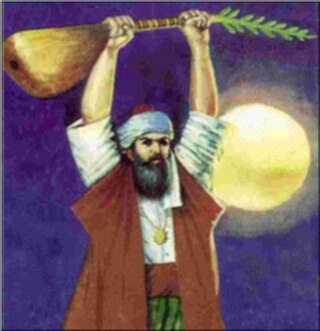
Alevism is a syncretic Islamic tradition, whose adherents follow the mystical Islamic teachings of Haji Bektash Veli, who taught the teachings of the Twelve Imams, whilst incorporating some traditions from Tengrism. Differing from Sunni Islam and Usuli Twelver Shia Islam, Alevis have no binding religious dogmas, and teachings are passed on by a spiritual leader as with Sufi orders. They acknowledge the six articles of faith of Islam, but may differ regarding their interpretation. They have faced significant institutional stigma from the Ottoman and later Turkish state and academia, being described as heterodox to contrast them with the "orthodox" Sunni majority.
The priestly caste is a social group responsible for officiating over sacrifices and leading prayers or other religious functions, particularly in nomadic and tribal societies.

Pir Sultan Abdal is an important religious figure in Alevism of Turkmen origin, who is thought to have been born in the village of Banaz in present-day Sivas Province, Turkey. He is considered legendary among his followers. His life is reconstructed from folkloric sources, especially religious poems which are believed to have been composed by himself and transmitted by ashiks.

The History of the Shī‘ah Imāmate Alevī Ṭarīqah or The History of the Alevism is that of a community of Muslims of Anatolia and neighbouring regions.
A dede is a socio-religious leader in the Islamic Alevi and non-Islamic Ishiki community. It is one of the 12 ranks of Imam in Alevism. The institution of dede is the most important of all the institutions integral to the social and religious organization of the Anatolian Alevis. Although much weakened as a result of the socio-economic transformation experienced in Anatolia towards the end of the nineteenth century, and particularly due to accelerated migration from the rural to the urban areas after the foundation of the Republic of Turkey, it played a primary role in the survival of Alevism until today. A descendant of a Dede is called a Hearth.
In Alevism, a Rehber is one of the 12 ranks of Imam in Alevism. A Rehber assists the Pir, provides information to the newcomers and prepares them for commitment to the Alevi path or Tariqat. Rehbers visit various settlements and collect information on the problems and inform Pirs about these problems.
Ishikism, also known as Çinarism, is a new syncretic religious movement among Alevis who have developed an alternative understanding of Alevism and its history. These alternative interpretations and beliefs were inspired by Turkish writer Erdoğan Çınar with the publication of his book Aleviliğin Gizli Tarihi in 2004.
Erdal Gezik is a contemporary writer on Alevis and honor crimes in Turkey.
Alev Alev is a 1984 Turkish action film, directed by Halit Refiğ and starring Tarık Akan, Gülşen Bubikoğlu, and Cüneyt Arkın.

Müslüm Doğan is a Turkish politician of Kurdish origin who served as the Minister of Development in the interim election government formed by Prime Minister Ahmet Davutoğlu on 28 August 2015. He was elected as a Member of Parliament for İzmir's second electoral district in the June 2015 general election. He is a member of the Peoples' Democratic Party (HDP). On 22 September 2015, he resigned from the interim election cabinet and was succeeded by Cüneyd Düzyol.

Pir Mehmed, better known as Aşık Çelebi, was an Ottoman biographer, poet, and translator. Born in Prizren, he served as kadi (judge) in many towns of the Rumelia. His major work Senses of Poets (Meşairü'ş-Şuara) of 1568 is of major importance.

Leyla Alev Kelter is an American rugby sevens and rugby union player.
In Turkish culture, the Seven Great Poets or Seven Great Ozans are seven ozans (singer-poets) who lived between 14th and 16th century that represent Alevi/Bektashi poetry and literature.

Özlem Alev Demirel-Böhlke is a Turkish-born German politician of Kurdish descent who is currently a serving representative of the party The Left as a Member of the European Parliament.

Kurdish Alevism refers to the unique rituals, sacred place practices, mythological discourses and socio-religious organizations among Kurds who adhere to Alevism. Kurdish Alevis consider their hereditary sacred lineages as semi-deific figures, often have beliefs more rooted in nature veneration, and put more emphasis on Pir Sultan Abdal as their religious symbol, unlike Turkish Alevis who emphasize the role of Haji Bektash Veli. Some Kurdish Alevis argue that their beliefs are related to Ahl-e Haqq and Yazidism.

Alev Alev is a Turkish drama television series directed by Ahmet Katıksız and written by Burcu Görgün Toptaş and Damla Serim. Alev Alev premiered on Show TV on November 5, 2020, and it is remake of Le Bazar de la Charité, a French miniseries. starring Demet Evgar, Hazar Ergüçlü and Dilan Çiçek Deniz in the lead roles.
Erdoğan Çınar is a Turkish writer known for promoting Ishikism. He has written extensively on Alevism, Bektashism, the history of religion, Turkish history and archaeology, and many other topics. Although proponents of Ishikism heavily depend on Erdoğan Çınar's works, others have criticized his works as historical revisionism or pseudohistory.
The Nationalist Alevi Bektashi Cultural Associations is a Turkish ultranationalist union of various Alevi associations.
This page is based on this
Wikipedia article Text is available under the
CC BY-SA 4.0 license; additional terms may apply.
Images, videos and audio are available under their respective licenses.








